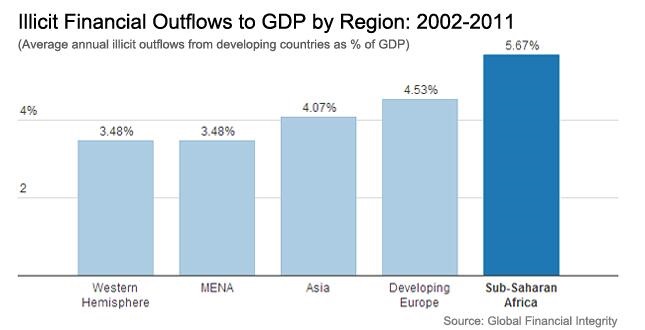
Hands passing money under the table corruption and bribery

The Global financial Integrity disclosed that, “As a percent of GDP, Sub-Saharan Africa suffers more from illicit financial outflows than any other region in the world”. The gravity of this statement is better appreciated when one considers that this part of the globe constitutes a huge percentage of the world’s youthful populations—many of which are poor, live on less than a dollar a day and suffer from low human development with poor access to healthcare, education and security. In effect, the region that needs help the most suffers the most from Illicit Financial Flows (IFF) which if rightfully curbed could aid development.
In the past I have written about Illicit Financial Flows in my article entitled “Africa: Tackling Illicit Outflows” but I have not really taken the time to define what they are. So what are they?
Illicit flows are all unrecorded private financial outflows involving capital that is illegally earned, transferred, or utilized, generally used by residents to accumulate foreign assets in contravention of applicable capital controls and regulatory frameworks. Thus, even if the funds earned are legitimate, such as the profits of a legitimate business, their transfer abroad in violation of exchange control regulations or corporate tax laws would render the capital illicit.
This definition was taken from the Global Financial Integrity Report dubbed, “Illicit Financial Flows from Developing Countries: 2002-2011“.
Illicit Money & Flight Capital
Further deepening our understanding, below is an excerpt from another report which defines some more terms for the uninitiated titled, “Illicit Financial Flows From Africa: Hidden Resource For Development“:
Illicit money is money that is illegally earned, transferred, or utilized. If it breaks laws in its origin, movement, or use it merits the label.
Flight capital takes two forms. The legal component stays on the books of the entity or individual making the outward transfer. The illegal component is intended to disappear from records in the country from which it comes.
By far the greatest part of unrecorded flows are indeed illicit, violating the national criminal and civil codes, tax laws, customs regulations, VAT assessments, exchange control requirements, or banking regulations of the countries out of which the unrecorded/illicit flows occur.
There are two main channels through which illicit capital, unrecorded in official statistics, can leave a country.
The World Bank Residual model captures the first channel through which illicit capital leaves a country through its external accounts. The second type of illicit flows, generated through the mispricing of trade transactions, is captured by the Trade Misinvoicing model which uses IMF Direction of Trade Statistics.
Mohamed Sultan, an economic governance program officer at the Open Society Initiative for West Africa offers yet another explanation of IFFs as follows:
When money is moved secretly and illegally from one jurisdiction to another, this constitutes an illegal financial flow. For developing countries, the term refers to money that leaves the continent instead of being used to finance development.
Such funds may be proceeds from organized crime, smuggling, corruption, money laundering, tax evasion, or international trade manipulations.
He adds:
While concentrated in a few countries such as Nigeria and Ghana, and essentially stemming from extractive and mining industries, IFFs are a burden for nearly all West African countries. Across the continent, only 3 percent of IFFs are derived from government corruption, while 33 percent comes from organized criminal activity and 64 percent from trade manipulations.
African economies have lost between $597 billion and $1.4 trillion in illicit financial flows in the past three decades. That’s nearly equal to the entire continent’s current gross domestic product. This plunder results in missed development opportunities, increased poverty, and continued injustice.
While many African nations are experiencing unprecedented economic growth, illicit financial flows (IFFs) prevent this growth from translating into better overall living conditions for Africans.
For more on measurements and the impact of IFFs on the human family and specifically sub-Saharan Africa, read the hyperlinked reports.






